Coming Clean: Why I’m Taking a Stand Against COVID Vaccines
Cory Zue, an “MIT-educated, well-meaning, rational (hopefully), Massachusetts-born, Democrat who works in public health” explains why he didn’t get the COVID vaccine, and why it isn’t okay to live in a world in which medical procedures can be forced on people without an impenetrable foundation of evidence to support them.
By
Cory Zue
Link copied
Miss a day, miss a lot. Subscribe to The Defender’s Top News of the Day. It’s free.
There’s no easy way to do this, so I’m going to just come out and say it.
I know that what I’m about to say may make some of you uncomfortable.
It might make some of you angry.
Maybe even scared.
But it’s who I am. It’s my truth.
I’m …
Wow, ok this is hard. Let me try again.
I’m …
… not vaccinated.
For COVID.
Phew! That was hard!
I almost feel like a weight has been lifted off my shoulders.
Are you still here?
Ok. Let’s continue.
For most people my vaccination status is surprising. For many, it’s incomprehensible.
How could an MIT-educated, well-meaning, rational (hopefully), Massachusetts-born, Democrat who works in public health still not have a COVID vaccine?
I’ve been asked this question many times — sometimes in good faith and sometimes less so. And each time, I’ve struggled to fully satisfy people with my response. So I thought maybe I’d try writing it down.
This essay is my attempt to explain my vaccination status as best I can. It’s a complicated answer, which touches on family, science, policy and morality.
It’s a topic that is simultaneously very personal and very broad — difficult to talk about and yet also important — perhaps, now more than ever.
What follows is likely to anger some of you, but I hope that it makes more of you curious, or even empathetic, to my position. We’ll see if I can pull it off.
Are you ready?
BUY TODAY: Robert F. Kennedy, Jr.’s New Book — ‘The Real Anthony Fauci’
The seed of doubt
I suppose the answer starts with my mother.
The first thing you need to know about my mother is that she is one of the smartest people I know. And not in the typical “my mom is amazing because she’s my mom” way but in the “my mom was one of the first women in the world to get a Ph.D. in computer science from MIT” way.
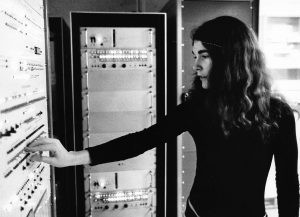
My mom at age 21, working at an MIT research lab on one of the world’s first computers (1969).
When I was a kid, my mom and I used to take regular walks to the grocery store, during which she would try to explain complex science to me in terms I could understand.
One time she told me how if you breathed in too much carbon monoxide — the pollutant from cars that can kill you if you idle in a garage for long enough — your blood cells would run around thinking it was the greatest stuff on earth, only it wasn’t.
Nothing else in the body wanted it. So the blood cells would carry it from organ to organ and the organs would say “no thank you” and the cells would try the next one. And the next one.
And eventually, if enough blood cells were running around carrying this useless stuff with nowhere to drop it off, then there wouldn’t be any left to carry the good things you actually needed (i.e., oxygen), and you’d die.
For years after that conversation, I held my breath every time I walked by an idling car. My blood cells wouldn’t get fooled by that awful stuff, thank you very much!
My mom is an independent thinker. Some of her contrarian opinions — for example, that high-fat foods weren’t necessarily all bad for you — were vindicated over time. Others — like the idea that the Egyptian pyramids were built over water and not on land — were not.
She was by no means right about everything, but she wasn’t afraid to go against the grain, something I’ve always admired.
When it comes to human health, my mom is a naturalist at heart. She believes that millions of years of evolution is more likely to be optimized for us than decades or even centuries of human science.
So, for example, she thinks the sun — which humans have co-evolved with since the dawn of time — is likely “net good” for you even though it is also known to cause some skin cancer.
She favors natural and whole foods and dislikes processed food and pesticides. And she often favors natural treatments and the human immune system to modern medicine.
You might see where this is going.
A contrarian thinker who generally distrusts modern medicine?
Ah yes.
The last thing you need to know about my mom — and one that’s the most relevant for this conversation — is that she’s not so hot on vaccines.
So that’s the start of it.
Now, my mom is an influence on my thinking, but she is not the only influence. I do not share her stance on vaccination.
Long before COVID, my mom discouraged me from giving my children their routine childhood immunizations. I take her opinion seriously, and so I looked into it closer. But when I looked into the evidence base, I drew a different conclusion.
Against her blessing, we decided to give our kids the shots. We did it a little later, and a bit more spread out than the recommended schedule — because it seemed low-downside and possibly advantageous — but we did it.
What my mother had provided was a seed of doubt. A reason to look closer at the science that everyone around me took for granted. If my mother did not exist, it would have never occurred to me that there was any reason to look into childhood vaccines — or later, COVID vaccines — and that would be the end of the story.
But she does exist. So when COVID came around and she again discouraged vaccination, I again took a closer look to try and figure out the truth.
I had no idea just how hard that would be.
And thus began a long, fraught, journey into the world of COVID science, data and policy. A journey that started months and months ago and slowly grew into what is now something of an obsession.
While much of the world has moved on, I’m still here reading COVID preprint papers, following epidemiologists on Twitter, looking at Our World In Data graphs, etc. I’ve become one of those people.
So what’s the answer? Was my mom right?
If only it were that easy.
But I’m getting ahead of myself. With the seed of doubt planted, let’s return to the story.
Watching and waiting
I’m an American, but I live in South Africa. This put me in a relatively unique situation early in the vaccine rollout. I could simply be a bystander.
South Africa — like all of Africa — had to wait for everyone in the first world to get their shots before we’d be given any. And when we finally got vaccines, we prioritized the old, healthcare workers and immunocompromised. I wasn’t eligible to get a shot until mid-July, 2021, more than 6 months after the vaccines were distributed to much of the developed world.
During this period I mostly waited and watched.
And a lot happened!
The Delta variant tore through India and spread to the rest of the world. COVID policy, and later vaccination policy created a fierce political divide in the U.S. and much of Europe.
Things went from “cutting in line to get the shot” to “here’s $100 to get the shot” to “get the shot or lose your job” in a surprisingly brief period of time. In a country that still had a 5% vaccination rate, the path to mandate was hard to imagine but impossible to ignore.
We also learned a lot about COVID and the vaccines.
With COVID, it became clear that the impact of the disease was highly stratified. If you were old and/or sick, COVID was really scary, and if you were young and healthy it was relatively mild. I studied CDC mortality statistics, trying to figure out the chances that I — a 39-year-old who runs 5 miles a day — might die from COVID.
I never got an exact answer but it was clear COVID was far less likely to kill me than a heart attack, and was perhaps on par with getting murdered. (Murdered in the U.S. — my odds of being murdered in South Africa are higher.) I’d never worried about heart attacks and murder before, so it didn’t seem rational to worry about COVID. So I stopped.
I then applied the same exercise to my wife — similar to me — and two healthy children — whose odds of dying were orders of magnitudes lower than ours. For kids COVID was as dangerous as the flu — again, something I hadn’t ever worried about except as a mild inconvenience.
I concluded our family was already safe enough from the disease and did not feel compelled to vaccinate for our own health.
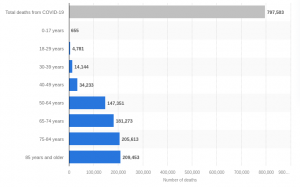
COVID deaths in the U.S. by age, as of Dec. 15, 2021. 3% of deaths are among people under 40 — many with other co-morbidities — and 25% are over 85. Source.
So we were ok. But what about vaccinating to stop the spread and protect those around me?
Well, around this time, we also started seeing evidence that the vaccine’s protection against infection was waning pretty quickly. About a month after I became eligible for my shot, a paper came out of Israel indicating that vaccine effectiveness against infection dropped to 50 or 60% after 6 months.
And on top of that, we saw evidence that vaccinated people carry equal viral loads and spread the disease as much (though for a shorter duration) as unvaccinated people.
I concluded there was a benefit to being vaccinated to protect those around me, but that it might be short-lived — or require boosting — to stay above a compelling threshold. And also that I could likely do just as much to protect those around me by continuing to only see people outside, wear a mask, etc.
The other thing that became clear during this time was that COVID would become endemic. That is — we would not be able to stop its spread and would have to learn to live with it in our lives. This meant that most of the measures we were taking weren’t stopping people from getting the disease, they were just delaying it.
If getting vaccinated meant I could prevent a COVID illness, that was pretty compelling. But if it only meant pushing the illness back a few months, that was a bit less remarkable. Still beneficial — by spreading the strain on health systems or allowing more time for new treatments to come out — just not nearly as much.
These factors created a backdrop where I could see that getting vaccinated meant stepping onto a treadmill of sorts. A treadmill that didn’t have any clear stopping criteria. The immunity would go, but the virus would stay. And to continue to be a responsible citizen I’d have to keep topping up my immunity.
Still, so what? Unless the vaccines were harmful, there was still no reason not to get vaccinated. And the vaccines were safe, right?
And the simple answer is “yes.” If I wasn’t worried about COVID then I should also not be worried about the vaccine. Yes, there were some rare side effects — some of which were quite serious — but these appeared to be less common than the serious problems associated with COVID itself. Statistically, the vaccines looked less dangerous than the disease.
But that seed of doubt lingered in the back of my mind. From what we knew, the vaccines were safe, but how much did we know? Did we have a complete picture of what the vaccines did, or were we standing on top of an iceberg with lots of information still lurking underneath?
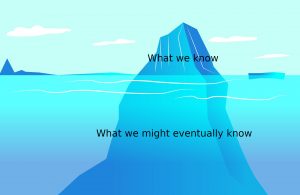
My main early concern about COVID vaccines was that our knowledge of them might look like this, with lots of information still to come in the months and years ahead.
What I could say definitively is we didn’t know everything. We’d been wrong about the vaccine effectiveness that was quoted when the shots were first released. There was no clinical trial data for boosters. The trials for kids were underpowered to demonstrate true risk/benefit from the intervention. And so on.
Did our lack of complete information mean the vaccines were bad? Of course not. Did it mean there was a chance the vaccines were bad? Maybe.
I tried to think about other times in history where it took a long time to learn that something was bad for us. Smoking and lung cancer. Asbestos. X-Rays and other cancers.
I wondered, if the vaccine made people 1% more likely to develop cancer or heart problems sometime later in life, how long would it take to figure that out? I decided the answer was probably quite a while. I decided to wait.
You might find my choice to remain unvaccinated a selfish act. To some extent it was. Part of me felt guilty about not “doing my part” to protect those around me. I was torn. But, looking at the balance of evidence — I could live with myself.
In life we constantly balance our selfish desires with the global good. If I were completely selfless I would be vegan, get rid of my car and donate all my extra money to people with less than me.
In the balance of selfish things I do every day, and the data as I understood it, I did not feel my decision to remain unvaccinated was wildly out of line with my own moral compass.
Still, my wife and I regularly revisited the prospect of getting the shot. But it was easier to put off the decision another day, another week, and so on than to take action. Perhaps, if we were less lazy we would have gotten it earlier.
And then we got COVID. And the picture changed again.
BUY TODAY: Robert F. Kennedy, Jr.’s New Book — ‘The Real Anthony Fauci’
Getting COVID, natural immunity and down the information rabbit hole
I don’t know how we got COVID, since we were continuing to be pretty careful/anti-social. The most likely source is through my toddler’s school, where a teacher and several students had it. Either way, there it was.
It went through the whole family. My wife got hit the worst and had bad flu symptoms for two or three days. I had one day that was pretty rough, but was back to exercising a few days later. The kids barely felt it. And that was that. Almost exactly as I’d predicted, and statistically very normal.
Being on the other side of COVID further changed the vaccine picture. In my province, they [url=https://coronavirus.westerncape.gov.za/vaccine/files/atoms/files/WCGH COVID19 Vaccination Fact Sheet 15 June 2021.pdf]didn’t recommend[/url] getting the shot within three months of a COVID infection, so I now had more time to think about the decision. Also, I now had some degree of future protection from the disease (a.k.a. natural immunity).
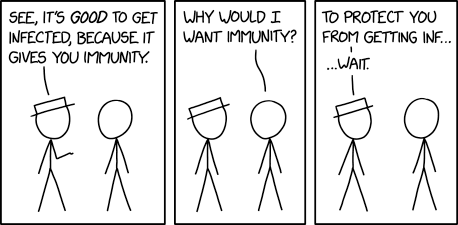
xkcd on natural immunity. Making a good point, but ignoring that many people already have natural immunity and did not “seek it out.”
Now natural immunity is another funny topic with COVID. No one can seem to agree how much protection you get from it. Policies in some places — including most of the U.S. — ignore natural immunity entirely.
And yet, simultaneously, much of Europe includes it in the definition of “fully vaccinated” in terms of their restrictions — at least for some period of time after infection. This apparent lack of consensus seemed odd, so I found myself digging into the evidence.
Sadly, the evidence was just as confusing.
One study that came out of Israel in August claimed that previously infected people were 27 times less likely to get infected and 9 times less likely to be hospitalized than vaccinated people. But then, many other papers claimed that vaccines produced “a more consistent, and higher-titer initial antibody response” — whatever that meant.
Then in November, the CDC published a study that found the complete opposite of the Israel data: infected people were 5 times more likely to be hospitalized with COVID than the vaccinated. Huh?!
My background is in engineering and computer science. I’ve been a practicing software developer for 15 years and done my fair share of data science in my career. But I’m not a biologist. Making sense of these papers was slow-going.
So I thought, “well, I’ll do what I normally do in other fields — I’ll just look to the experts to tell me what the answer is.”
Unfortunately, the experts didn’t agree either!
Instead, the experts seemed to say whatever supported their own previously-held positions. Experts who favored vaccination loved the CDC study. Experts who thought COVID policy had become too extreme hated it. It was enough to make my head explode. How can we not know these things? How is there not consensus?
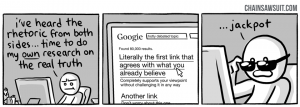
I knew that individuals were highly susceptible to confirmation bias. I didn’t expect to find it among all the scientific experts.
I went deep on this topic, trying to form as unbiased an opinion as I could based on reading as many papers and conflicting opinions as I could.
My conclusion after many, many hours of research was that my natural immunity was at least as good as any vaccine. (There are a large number of scientific papers acknowledging that natural immunity is likely more protective — or at least as good and longer-lasting — than vaccination when looking at the outcomes of Covid infection and severe disease. To my knowledge, the CDC paper is the only one that claims the opposite.)
Probably far better than one dose of J&J. Maybe not as good as two doses of Moderna. Either way, I was now as “protected” and as “safe to society” as anyone who’d been vaccinated.
The other conclusion I drew from this exercise was that our information ecosystem was pretty broken. I had tried to get an answer to what I thought was a simple question — ”how protective is natural immunity vs vaccination?” — and found it to be a deep and complex rabbit hole of evidence and opinions.
I also observed a serious disconnect between how confident people were and the body of contradictory evidence. To borrow a term from Wait But Why, everyone was operating in the Arrogant Zone.

The knowledge/conviction graph, from Wait But Why’s The Thinking Ladder. With COVID it seemed too many people were operating in the “Arrogant Zone.”
The simplest answer was: we aren’t sure! But everyone was talking as if they knew everything, despite equally-credentialed people across the aisle saying the polar opposite.
I had thought being scientifically-minded meant continually questioning consensus opinions with new information, but here things had turned on their head. Science was being used to affirm our previously held beliefs, rather than help us see truth.
As I continued down the COVID rabbit hole, what did become clear is that I had to “correct for bias” in everything I read about COVID. I would see a study and immediately think “ah the New York Times is gonna love that one.” Or another one and think “The Brownstone Institute is gonna be all over this.”
Media outlets that I had trusted my whole life morphed into these predictable propaganda machines, amplifying the information they liked and ignoring the information they didn’t. I realized that to see the whole picture I had to follow a wide group of sources with a broad range of opinions and draw my own conclusions.
I also realized that almost no one around me was doing anything like what I was doing. Instead, most people were living in an ideological echo chamber, certain that it represented the truth. I don’t blame people for this — getting a broad view takes a lot more time and effort — but it was troubling that this was the position we had gotten ourselves into.
The slow turning of public opinion
What also became clear to me is that the downstream effects of these COVID information echo-chambers was having a big impact on policy and public opinion.
Here again, my position in South Africa provided a unique perspective into the things that started happening elsewhere in the world. Specifically, the politicization and polarization of all things pandemic, from masks to lockdowns to vaccines to mandates.
As I said, I’m American and most of my friends are still in the U.S.. What became striking was how different the conversations I was having in South Africa were from the conversations people were having in the U.S.
It was a slow transition, but here are a few moments that punctuated it for me.
August, 2021: On a call with an American friend, I mentioned my vaccination status in the context of an upcoming trip to the States. He told me that it was likely that a lot of my friends would not be comfortable seeing me. This was a real shock as it literally had never once come up in South Africa at this time (I’d only been eligible for the shot for a few weeks). I checked with another friend and they confirmed this sentiment was common. Wow!
September, 2021: When I told my American friends I had COVID, my vaccination status came up. Someone said, “whoa, are you a conspiracy theorist or something?” Again, I found this to be a strange question. The topic of vaccines here was largely an independent, personal choice but clearly in the U.S. it had become something … else. Huh.
October, 2021: I was talking to an American executive of a U.S.-based company that does some government contracting. The topic of compliance for Biden’s OSHA vaccine mandate — which the company fell under — came up.
He mentioned he was concerned about how to roll it out because “in a group of 100 people there’s probably one or two crazies in there.” It was said so casually that I was a bit taken aback. Was I crazy?
November, 2021: I was having dinner with some Americans who were visiting Cape Town. One of them mentioned they weren’t vaccinated. Given that he was a liberal-leaning American, I was shocked and excited to find a potential ally. “Whoa, really?!” I asked. And then he awkwardly had to explain that it was a joke — of course he was vaccinated. Pretending you were unvaccinated was … funny?
All of these interactions were small. None of them harmed our friendships (at least that I’m aware of). All of them turned into little opportunities for me to attempt to explain my position, data around natural immunity, and generally try and convey how someone like me — someone who seemed reasonable and didn’t fit their typical image of a Trump-loving, science-denying anti-vaxxer — might still choose not to get vaccinated in today’s world.
My points didn’t usually land, but I took my shot.
At the same time, the smallness of these interactions stayed with me. The casual way in which there were clear “sides” to this thing. In which it was obviously “right” to be on one side, and that the people who felt differently were somehow conspiracists, crazy, and worthy of mockery. The casualness of it all was the most striking.
I’ve seen this “othering” before in various forms. I’ve been a part of many conversations — some in the workplace — where it was perfectly acceptable to casually mock and dismiss anyone who supported Donald Trump.
I wondered what it would be like to be a Trump supporter in a place like that. Whether you’d try to defend your position. Whether you’d keep silent. Or whether you’d eventually be shunned and forced out. And suddenly I was getting a taste for it. Vaccine status had become a “safe” place to mock and shame our fellow people.
Was this ok?
In South Africa, our vaccination rate slowly climbed to 20%, then 30% of the population, but the vaccinated remained a minority. Most of my personal network was vaccinated, but the national picture was still quite different. And my interactions were quite different.
Everyone was respectful. No one made assumptions. No one has shamed me. If my status comes up, it’s usually a level-headed and nuanced conversation. I’ve never had any of these “othering” experiences that became commonplace with the people in the west.
Something clearly different was happening in America. For reasons that were clearly not just about public health.
It didn’t sit well.
The growing logical divergence
As time went by I became increasingly confused by what appeared to be a growing divergence between science, common sense and policy.
On the science side the effectiveness of vaccines against infection continued to wane. The vaccines continued to do great at preventing hospitalizations and deaths, but there was now no doubt that they weren’t going to contain the spread. Countries with 80 or 90% of their adult populations vaccinated saw their largest waves ever.
Israel redefined “fully vaccinated” to mean three shots instead of two, and people started talking about doing the same in Europe and the U.S.
Natural immunity also waned over time, but appeared to last longer than vaccines. (During this period I wrote a very different essay to this which attempted to break down the evidence base surrounding vaccine effectiveness, risks, natural immunity, and other topics. You can find more details and citations for many of the positions I’ve taken there. Note that I haven’t kept it updated since publication in October, 2021.)
I looked at the global picture and thought, well it’s clear that the vaccines aren’t stopping the spread of disease. It looks like getting vaccinated is moving towards becoming more of a personal health decision than a public health necessity.
So maybe mandates are no longer required? Or perhaps at a minimum we’ll recognize natural immunity is at least as good as these vaccines?
Oh you sweet summer child. This perspective turned out to be hopelessly naive.
Instead, mandates continued to be pushed, harder and harder, and with more and more tenuous logical reasoning.
I became ineligible to enter Canada — my wife’s home country — due to my vaccination status. I can no longer dine in many of the most popular cities in the U.S. The goal of pandemic policy seemed to have changed from “stop the virus at all cost” to “increase vaccination rates at all cost,” and so a policy that increased vaccination that was deemed “successful” even if it didn’t really … well … stop the virus.
And there was a cost. Thousands of people were losing their jobs. Hospitals were hurt by staff shortages in part because they had fired healthcare workers — people who risked their lives and got COVID early in the pandemic, but whose natural immunity wasn’t recognized. Students were being kicked out of universities. Long-tenured, celebrated doctors and professors were fired from their jobs.
The gap between policy and common sense didn’t just apply to vaccines. Mask policies in many places became a circus. People would put on their masks for 30 seconds walking through a restaurant, only to dine unmasked for 2 hours, and somehow everyone accepted this was helping.
The U.S. masked kids, often as young as 2, despite this being against World Health Organization recommendations, and being based on a very tenuous base of circumstantial evidence. Did we have any idea what harm that was doing?
Every time I walk into a restaurant with my mask affixed for 30 seconds before being seated, then spend 45 minutes unmasked eating and drinking, and then affix my mask again for 30 seconds while leaving, I give thanks for how many thousands of lives this practice has surely saved
— Michael Tracey (@mtracey) October 17, 2021
The decoupling of evidence from policy and public opinion created a fierce rift in society. It also created a group of people — people like me — who paid attention to the science and saw just how much our trusted institutions were getting wrong. This erosion of public trust will take a long, long time to repair.
I tried having conversations about this with people around me — people who were very smart, highly educated and generally open and liberal-minded — and was consistently met with fierce resistance.
Usually we disagreed about the facts. How effective the vaccines were, how risky they were, whether it mattered if you were old, young, infected, etc. Fact-based disagreements were tricky because — like I found on the topic of natural immunity — the evidence base was overwhelmingly complex.
I couldn’t bring everyone along my 100-hour research journey, and there was plenty of evidence out there to support whatever position anyone wanted to have.
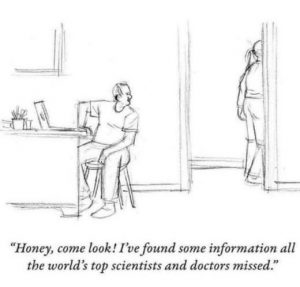
How I sounded whenever I attempted to take a position that was not considered “scientific consensus.”
What was most effective in these conversations was pointing out where there were clear differences of COVID policy globally.
Pointing out that natural immunity was widely acknowledged in Europe’s COVID pass system, for example. Or that Germany and France suspended giving Moderna shots to anyone under 30 because of heart inflammation risks. But whenever I presented an opinion that diverged from most government policies the conversation became almost impossible.
I get it.
It’s pretty hard to fathom that most of the world might be operating on imperfect and incomplete information. It’s hard to believe that some random person who did some internet research has a more balanced, or nuanced position on COVID than Anthony Fauci.
But Fauci sits on the edge of a complex spectrum of opinion related to COVID policy. Many equally-credentialed experts in public health and epidemiology think very differently.
And there are even highly credentialed experts who believe the vaccines might be far more harmful than we believe. Somewhere in this mess lies the truth. The biggest difference between Fauci and the other experts is that Fauci has the biggest microphone.
The Omicron disruption
It had become clear to me that we were spinning into a weirder and weirder place at faster and faster speeds with our COVID policies.
And then came Omicron.
And if pandemic policy had already become decoupled from science and common sense, Omicron put this divergence into hyperdrive.
Once again being in South Africa provided a unique perspective into what was going on with the pandemic. Where historically living here was like living four or five months in the past, now all of the sudden I was living in the future! We went through Omicron first and were weeks ahead of the rest of the world in terms of what the impact would be.
And Omicron turned the balance of pandemic policy upside-down in every way.
First it was impossible to contain. It spread like wildfire and tore through populations regardless of what measures were put in place. Vaxxed? Previously infected? Masked? Don’t matter. Omicron finds you.
Second, it was much more mild. And I know that as of the time of this writing (Jan. 4, 2022) that some people don’t feel ready to admit that to be true, it is getting more and more impossible to ignore. In South Africa — now on the downward slope of our Omicron wave — the “peak” of deaths has been only 1/10th as big as previous waves.
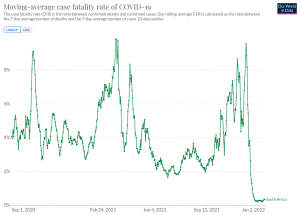
The case fatality rate of COVID in South Africa. Omicron became the dominant variant almost exactly where it falls to near zero. Source: Our World in Data
Third, it largely evades vaccines. Many of Omicron’s mutations are in the spike protein that is used by the vaccines to confer immunity. It appears the changes substantially reduce the effectiveness of the vaccines against infection to levels bordering on zero just a few months after the shot. (Discovery — South Africa’s largest medical insurer — published a large study indicating the effectiveness of 2 doses of Pfizer against Omicron infection fell to 25% after 3 months. Many places which publish data by vaccination status are now seeing equal or even more infections among the vaccinated (for example Ontario or the UK.)
So now we have an impossible-to-stop virus that looks a lot like the common cold. And we have a heavy-handed global mitigation strategy based on vaccination that does very little to stop it. Surely, I thought, we will now see that these policies, and especially vaccine mandates, do not make any logical sense?
Fool me once, shame on you. Fool me twice, shame on me.
Instead, the mandate train kept right on coming. Universities started mandating boosters for healthy 20-year-olds. Kenya announced — two days before Christmas — that all airplane travelers would require vaccination to enter or exit the country. Because … the variant that evades vaccines was spreading.
Kenya’s policy change forced us to cancel our planned holiday trip with less than two weeks’ notice. In a fun twist of irony, the policies rolled out the same day I got my yellow fever vaccine for the trip.
The public opinion train steamed on as well. As cruise ships, parties and weddings of fully-vaxxed, often boosted, people created massive spreading events, people continued to celebrate their cities’ vaccine mandates on Instagram, shame the unvaccinated on Twitter and grow the ever-increasing divide among us.
Here in South Africa, we had all but declared the pandemic over.
The day after Kenya mandated vaccination for air travel, South Africa issued a remarkable update to it’s COVID guidelines. No more contact tracing. No more isolation or testing of COVID contacts. No more need to isolate even if you test positive for COVID, as long as you weren’t sick. And no different treatments for vaccinated or unvaccinated people.
The government acknowledged what is now obvious: this virus is here to stay, it’s not that bad anymore and we need to live with it and get back to our lives.
I was shocked. Not because I disagreed with the changes, but because I didn’t think the government would be willing to do something that would be so obviously controversial. I was never more proud to be in South Africa than I was at that moment.
And then just a few days later, they rolled back the guidelines. Citing “media, stakeholders and public enquiries,” they decided to take more time for comments. We’re now back in limbo with our old rules. And once more the court of public opinion is leading policy instead of the science.
The world is standing on a knife’s edge right now. As parts of the world (and even parts of the U.S.) declare the pandemic over and move on, other parts are increasing restrictions, mandating further shots and tests and deepening a strong political and ideological divide among us.
Now we are faced with a crucial decision. Do we continue pushing harder and harder down the path of coercion and dehumanization, with ever-increasing harm and ever-diminishing returns? Or do we take a beat, admit that the picture has changed, and try to find ourselves back to acceptance and sanity?
I wish I knew the answer. But I know what I’m hoping for.
Epilogue
You might be wondering, well why not just get the shot?
And of course, of course, it would be great to be among the privileged vaccinated class right now. I do not like being forced to take a COVID test to step into my son’s school (even though my natural immunity is better than some of the vaccinated people and their 13% J&J efficacy). I do not like having my holiday plans canceled at the last minute. I do not like not being able to visit my wife’s home country.
And it’s not that I’m scared, or that I think something bad will happen to me if I get the vaccine. I believe the vaccines are safe enough. As I mentioned, the evidence suggests that my risk from the vaccine is less than the risk I accepted for my first bout of COVID, which I also wasn’t scared of.
At the same time, I do genuinely believe that given my previous infection the risk/benefit of the vaccine is negative. That is — I think it is more likely to do harm than good. And I believe that any good it will do is temporary and futile in the long term.
The overwhelmingly likely outcome is that the vaccine would do just what the virus did: maybe inconvenience me for a day or so, and then I’d be on with my life. Rationally, isn’t that worth being able to live “normally” again?
Yes. That would be worth it. But the issue is no longer the vaccine. The problem is the precedent.
I don’t believe it’s ok to live in a world in which medical procedures can be forced onto people without an impenetrable foundation of evidence to support them. And I’m just not seeing that from where I stand.
The world I want to live in is a world where we make and enforce rational, evidence-based policies based on the good of the population. A world in which we defer some autonomy to individuals to make their own decisions regarding their health and don’t keep them from going out to dinner or getting on an airplane if we disagree with them.
I’d also like to live in a world where we stop shaming “the other,” and I’ve decided that one way I can do that is by declaring myself as part of “the other.”

“I. Am. Unvaccinated.”
Earlier I didn’t take the shot because I wasn’t sure it was good for me. But now? Now I’m not taking the shot because I’m taking a stand.
I’m taking a stand because if people like me don’t stand up against what’s going on in the world right now then things will only get harder and weirder and scarier for other people like me. I’m worried that if we don’t get off this path soon, it’s going to get harder and harder to turn back. And I don’t want to see where that ends up.
At the end of the day, we’re all just trying to do our best.
We’re trying to make the decisions we believe are best for ourselves, our families and our communities, based on our best understanding of the world.
But the world is complicated. All it takes is a brief glance through history to realize that we humans have been confident and wrong about many, many things, from slavery to smoking to carbon emissions. Every day we learn more than we did the day before, and hopefully every day we make better choices.
But, sometimes we get lost.
I think society is pretty lost right now. And maybe, just maybe, my story can set one or two of us on a better path.
We’re in this together.
We’ll get through this together.
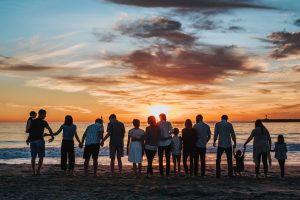
Photo credit: Tyler Nix on Unsplash.
Big thanks to Rowena Luk, Neal Lesh, Mike McCandless, Greg McCandless, Andrew Marder, Gareth Dwyer, Will Pride, and two people who chose to remain anonymous for reading drafts of this.
How can you help?
Concretely, some of the big things I’m concerned by are:
1. The decoupling of our COVID policies from the body of evidence. A few obvious policies that do not have clear scientific backing include:
- The lack of acknowledgment of natural immunity for many “immunity passport” systems.
- Travel restrictions and quarantines when the virus or variant is already spreading locally.
- The use of cloth masks on very young children in the U.S.
- Vaccine mandates for anyone whose risk of a serious COVID outcome approaches zero, including young children and previously-infected young adults.
- Any vaccine mandates which are justified as stopping or slowing the spread of disease in the face of Omicron.
2. The vast degree of censorship happening on our big tech platforms for credible experts who take non-consensus opinions. We should always be debating the science, not shutting down science we disagree with.
3. The casual “othering” of the unvaccinated, and casual dismissal into their right to choose what to put into their body and freedom to live their lives in society.
4. The slow drift into authoritarian behavior in some places (Austria, Germany and Australia, to name a few).
If you’re also concerned about any of these things, but have kept silent to date, now is the time to speak up. Without your voice things aren’t going to change.
Have a conversation on these topics with a friend. Share this essay if you’d like. Or go amplify the message of Vinay Prasad, Jay Bhattacharya, Zubin Damania, Marty Makary, Sunetra Gupta and the dozens of other powerful COVID centrists — all highly credentialed doctors or scientists — who are speaking out against many of our current policies.
Post on Facebook. Join a protest. Resist.
If you don’t agree with me, that’s ok. I know that for many of you COVID is still (rightly) very scary, and that you may look at the complicated body of evidence and feel the case for vaccination and mandates is clear-cut.
To you, I’d simply ask to try and seek out and listen — really listen — to someone who disagrees with you. Be curious. They might surprise you.
And try to remember that just because you disagree with their choices that doesn’t necessarily mean that they are wrong or that they are bad people.
The views and opinions expressed in this article are those of the authors and do not necessarily reflect the views of Children’s Health Defense.
https://childrenshealthdefense.org/defender/cory-zue-coming-clean-stand-against-covid-vaccines/?utm_source=salsa&eType=EmailBlastContent&eId=0e833e6f-41d4-4a9c-a3aa-386bf425dd10
Thanks to: https://childrenshealthdefense.org
 RSS Feed
RSS Feed















 January 14th, 2022
January 14th, 2022  Awake Goy
Awake Goy  Posted in
Posted in  Tags:
Tags: 













